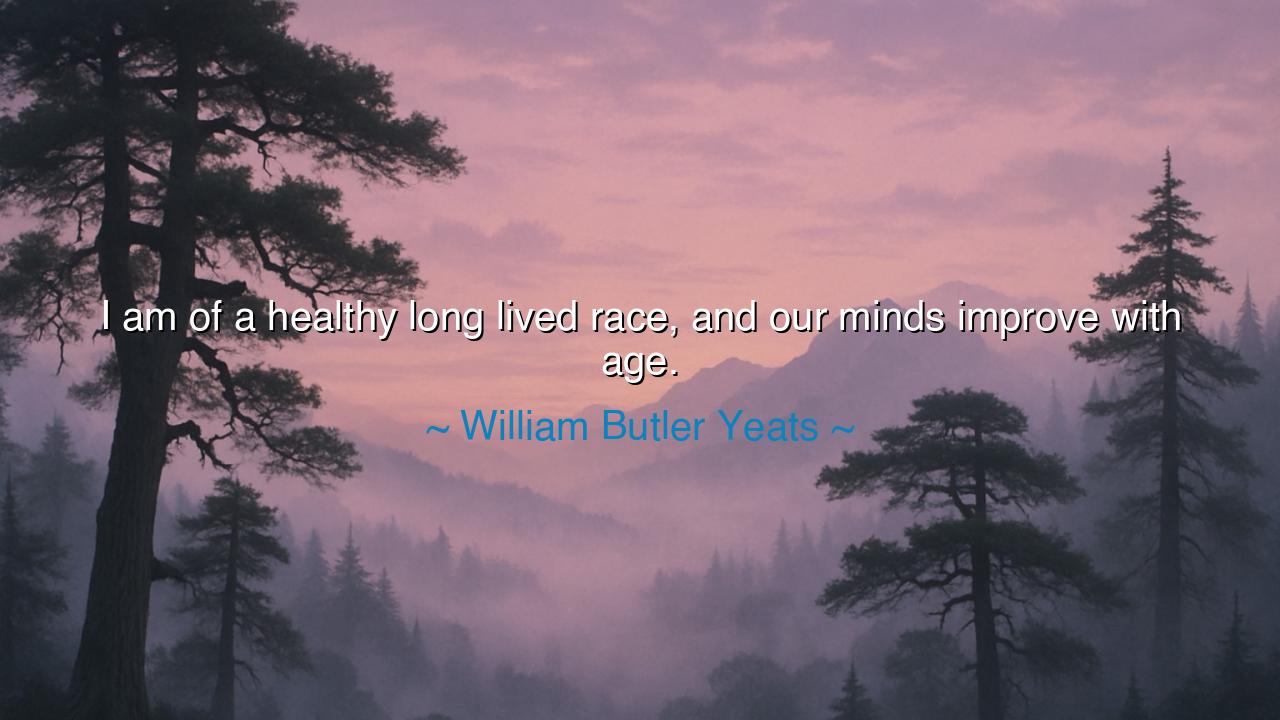
I am of a healthy long lived race, and our minds improve with






The poet-seer William Butler Yeats, whose words carried both the fire of youth and the wisdom of age, once declared: “I am of a healthy long-lived race, and our minds improve with age.” In this statement, there echoes both pride and prophecy — the affirmation that the passage of years need not be a decline, but an ascent. For Yeats, who grew wiser and more powerful as his life unfolded, age was not decay but transformation. His was the voice of a man who refused to bow to time, who understood that though the body may tire, the mind — disciplined, passionate, and alive with curiosity — can grow ever sharper, more profound, more radiant with meaning.
The origin of this quote lies in Yeats’s later reflections, when he stood at the threshold of his elder years and looked back upon a life spent in pursuit of art, spirit, and truth. Born into the Celtic twilight of Ireland, Yeats lived through rebellion, heartbreak, and the fading of the old world into modernity. Yet he did not despair. Instead, he grew more creative, more daring, more truthful with every passing decade. The young Yeats wrote of dreams and fairies; the older Yeats wrote of eternity and the fierce will that defies mortality. In saying his “mind improves with age,” he affirmed that the flame of the soul, if tended, burns brighter in the twilight than in the dawn.
To say that the mind improves with age is to challenge one of the great illusions of modern life — the belief that youth holds all the glory, and that time only takes away. Yeats saw deeper. He knew that while the young possess speed and passion, only age grants depth and perspective. The youthful heart sees what is near; the mature mind sees what is eternal. Through struggle, disappointment, and contemplation, the elder learns what the young cannot — that joy is deeper than pleasure, wisdom richer than knowledge, and endurance greater than strength. Age, Yeats teaches us, refines the spirit as the blacksmith refines iron: through the heat of life’s trials and the patience of its cooling.
Consider the story of Sophocles, the ancient Greek playwright. In his youth, he wrote tales of war and victory, echoing the heroism of men. But in his old age, he composed Oedipus at Colonus, a play of forgiveness, fate, and divine understanding — a work so profound that it seemed the voice of eternity itself. When accused by his own sons of senility, he read from this play before the court, and the judges, moved by the beauty of his words, declared, “Sophocles is not mad — he is inspired.” Thus, age had not diminished him; it had illuminated him. Like Yeats, he proved that the mind, when nourished by reflection and devotion, does not fade — it transcends.
Yeats’s claim of belonging to a “healthy, long-lived race” is more than a statement of bloodline; it is a declaration of spiritual heritage. He speaks not merely of family, but of a lineage of souls who live long because they live deeply — those who keep the intellect alive through curiosity, art, and wonder. His words are a hymn to vitality — not the fleeting vigor of the body, but the enduring vitality of thought and imagination. Such health is not measured by years alone, but by engagement with life: to read, to create, to love, to question. This is the nourishment that keeps the mind alive while others grow weary.
Yet Yeats does not speak with arrogance, but with gratitude. To him, age is not a burden but a blessing — the culmination of all that one has been. As he aged, he did not retreat into silence; he wrote some of his greatest poems in his seventies, blazing with spiritual defiance and creative energy. “An aged man is but a paltry thing,” he once wrote elsewhere, “unless soul clap its hands and sing.” He lived those words — clapping, singing, creating until his final days. His example reveals that to age well is to remain in love with life, to let curiosity outlive desire, and wisdom outshine vanity.
The lesson, then, is radiant and clear: age is not your enemy — stagnation is. The years that pass are not thieves but teachers, offering the gift of perspective to those who keep their hearts awake. To improve with age, as Yeats did, one must cultivate the mind as a garden: plant seeds of knowledge, tend them with reflection, and prune away the weeds of bitterness and regret. Continue to learn, to question, to create. Seek conversation, art, and truth, for these are the elixirs that defy decay. The body may bend with time, but the mind, if fed with purpose, can still reach for the heavens.
Thus remember, O traveler through the seasons of life, that the decline of youth need not mean the dimming of light. Let your years be your ascent. Be like Yeats — let your mind, your spirit, your imagination improve with age, until even in your final hour, your thoughts blaze with the wisdom of the sun setting over a world it still loves. For in the heart that continues to wonder, and the mind that continues to grow, time itself bows in reverence — and death finds no victory there.






AAdministratorAdministrator
Welcome, honored guests. Please leave a comment, we will respond soon